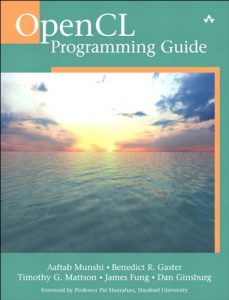Written by five leading OpenCL authorities, OpenCL Programming Guide covers the entire specification. It reviews key use cases, shows how OpenCL can express a wide range of parallel algorithms, and offers complete reference material on both the API and OpenCL C programming language.
Through complete case studies and downloadable code examples, the authors show how to write complex parallel programs that decompose workloads across many different devices. They also present all the essentials of OpenCL software performance optimization, including probing and adapting to hardware. Coverage includes
- Understanding OpenCL’s architecture, concepts, terminology, goals, and rationale
- Programming with OpenCL C and the runtime API
- Using buffers, sub-buffers, images, samplers, and events
- Sharing and synchronizing data with OpenGL and Microsoft’s Direct3D
- Simplifying development with the C++ Wrapper API
- Using OpenCL Embedded Profiles to support devices ranging from cellphones to supercomputer nodes
- Case studies dealing with physics simulation; image and signal processing, such as image histograms, edge detection filters, Fast Fourier Transforms, and optical flow; math libraries, such as matrix multiplication and high-performance sparse matrix multiplication; and more
- Source code for this book is available at https://code.google.com/p/
opencl-book-samples/






